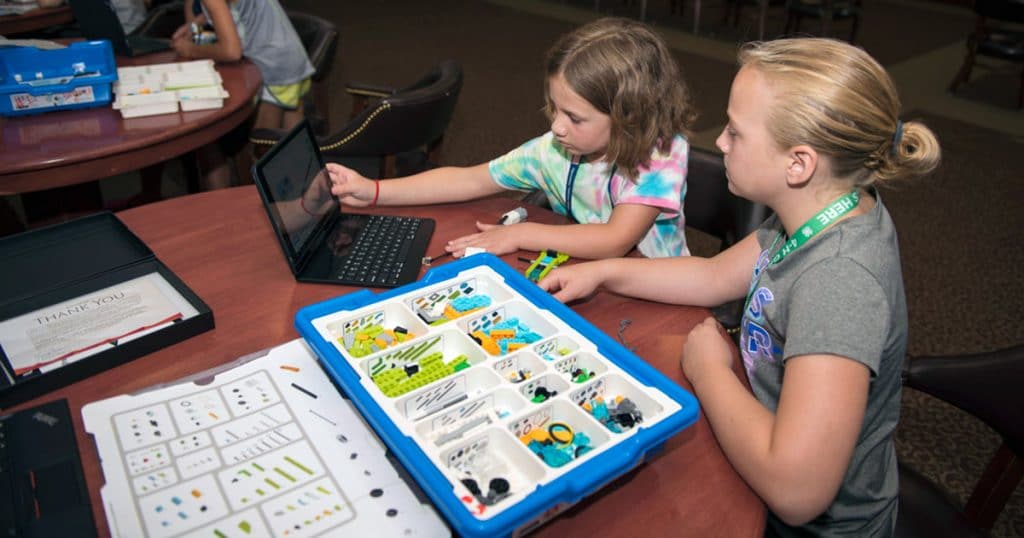Homeschooling has been on the rise in recent years, with many parents choosing to educate their children at home. Accompanying this trend is increasing demand for homeschool teachers, an attractive role or occupation due to the flexible lifestyle. But how do you become a homeschool teacher?
The essential requirements to be a homeschool teacher vary by state. A high school diploma or equivalent is usually required, as well as expertise in the subjects taught. You also need the ability to develop individualized lesson plans and evaluate progress. Some states require additional qualifications or certifications.
The payoffs from becoming a homeschool teacher can be both personal and professional. Let’s explore what being a homeschool teacher is like, how you go about becoming one, and the benefits you provide to your students.
Job Requirements to Be a Homeschool Teacher

The qualifications required to become a homeschool teacher do vary by state. However, most states do not require a valid state teaching license. A number of exceptions are discussed later.
Even if your state does not require additional education or certification, you need a strong understanding of the subjects you will be teaching. Many instructors choose to participate in professional development opportunities, attend conferences, and connect with other homeschool educators to continue improving their teaching skills.
High school diploma at a minimum
While specific requirements vary by state, most states require homeschool teachers to have at least a high school diploma or equivalent. This requirement is intended to ensure teachers have a basic level of education and knowledge to effectively teach their children.
Additionally, homeschool teachers should have a strong grasp of the core academic subjects, including reading, writing, math, science, and social studies.
Extra requirements for professional homeschool teachers
Depending on the state, professional homeschool teachers may be required to meet additional requirements compared to parents who homeschool their own children. For example, in some states, professional homeschool teachers may be required to have a teaching certificate or other professional qualifications.
They may also need to follow certain guidelines or regulations for curriculum and instruction, and may be subject to regular evaluations or assessments to ensure that their teaching methods and student outcomes meet state standards.
Additionally, professional homeschool teachers may be subject to background checks or other screening requirements to ensure the safety and well-being of their students.
Criminal background check
Passing a criminal background check is a common requirement for homeschool teachers in most states, regardless of whether or not certification is required. This is to ensure that children are in a safe and secure environment and are not being taught by individuals with a criminal history.
The specific requirements for background checks can vary from state to state. Some states require only a basic criminal background check, while others may require more extensive checks, such as fingerprinting or child abuse registry checks. The cost of the background check is typically borne by the teacher seeking certification.
The background check helps to ensure the safety and well-being of the children who will be taught by the teacher. It is also an important consideration for parents who are hiring a homeschool teacher to work with their children, as they want to ensure that the teacher has a clean record and is trustworthy.
Subject expertise
In general, homeschool teachers in the United States are expected to have a solid understanding of the subjects they’re teaching. Many homeschool teachers actually have advanced degrees and are experts in their chosen subjects.
If a homeschool teacher wishes to teach a specialized subject, such as driver’s education or physical education, they may need to meet additional requirements. For example, some states require homeschool teachers to have a specific certification or training in order to teach driver’s education. Similarly, some states require homeschool teachers to have a degree or certification in physical education in order to teach that subject.
Overall, homeschool teachers must be knowledgeable in the subjects they’re teaching and be able to effectively convey that knowledge to students. Depending on the state and subject matter, they may be required to have specific qualifications or certifications in order to do so.
Planning and assessment skills
Developing individualized lesson plans and evaluating progress are important skills for homeschool teachers. You must be able to identify the individual needs and learning styles of each student and create lesson plans that cater to their needs. This may involve incorporating hands-on activities, visual aids, or technology into lessons.
To evaluate progress, homeschool teachers may use a variety of methods, including quizzes, tests, essays, projects, and portfolios. They assess their students’ progress in a fair and objective way and provide feedback to help students improve. This may involve tracking and analyzing data, adjusting lesson plans as needed, and communicating regularly with students and parents about progress.
In addition, homeschool teachers should be able to identify areas where students need extra support or challenge and adjust their teaching strategies accordingly. They should also be able to communicate effectively with parents, including keeping accurate records of attendance and grades.
States Which Require Teacher Certification
At the time of publishing, based on our research, the following 11 states require professional homeschool teachers to have a valid teaching license or certification.
- Alaska. Homeschool teachers in Alaska are required to have a valid teaching certificate or a teacher’s permit. The permit is issued by the Alaska Department of Education and Early Development and is valid for one year.
- Connecticut. Teachers must hold a valid Connecticut teaching certificate or provide evidence of equivalent qualifications. They must also submit a notice of intent to homeschool.
- Georgia. Teachers are required to hold a valid teaching certificate or a bachelor’s degree in the subject they are teaching. They must also submit an annual declaration of intent to homeschool to their local school district.
- Idaho. You’re required to hold a valid Idaho teaching certificate or a bachelor’s degree in the subject you’re teaching. You must also submit a notice of intent to homeschool.
- Kentucky. A valid Kentucky teaching certificate is required, or evidence of equivalent qualifications. You must also submit a notice of intent to homeschool to the local school district.
- Maine. A Maine teaching certificate is needed or a bachelor’s degree in the subject being taught. You must also submit a notice of intent to homeschool to your local school district.
- Minnesota. Homeschool teachers in Minnesota are required to hold a valid Minnesota teaching certificate or a bachelor’s degree in the subject they are teaching. They must also submit an annual report to their school district.
- North Dakota. A valid North Dakota teaching certificate is required or a bachelor’s degree in the subject. You must also submit a notice of intent to homeschool to the school district.
- Pennsylvania. Homeschool teachers in Pennsylvania must hold a valid Pennsylvania teaching certificate or provide evidence of equivalent qualifications. They must also submit a notarized affidavit to their local school district.
- Tennessee. A valid Tennessee teaching certificate is needed, or evidence of equivalent qualifications. Teachers must also submit a notice of intent to homeschool to the school district.
- Virginia. Homeschool teachers in Virginia must hold a valid Virginia teaching certificate or provide evidence of equivalent qualifications. They must also submit a notice of intent to homeschool to their local school district and provide evidence of their qualifications.
What Does a Homeschool Teacher Do?

Homeschool teachers educate students in a variety of settings, including at home or in a classroom for specialized topics like art or woodworking. They may teach students at the elementary, middle, or high school levels. Some homeschool teachers teach in-person, while others tutor students online.
Homeschool teachers must take into account the wishes of the parents, which can vary widely. For example, parents may ask them to emphasize their ethnic heritage over general history, or focus on hands-on work instead of educational lectures.
Engaging students
There are no specific requirements for homeschool teachers to demonstrate their ability to engage the interest of school-age children. However, this is a crucial aspect of the job and one that can greatly impact the success of homeschooling.
Homeschool teachers must be able to create a learning environment that is engaging, stimulating, and encourages students to be active participants in their own education. This requires the ability to plan and deliver lessons that are interesting and relevant to the students, as well as the ability to adapt teaching techniques to the individual learning styles of each student.
Some ways that homeschool teachers can demonstrate their ability to engage the interest of school-age children include incorporating hands-on learning activities, using technology in the classroom, creating a positive and welcoming learning environment, and providing opportunities for student-led learning and exploration. Additionally, homeschool teachers should have excellent communication skills, be able to provide constructive feedback to students, and create a safe and supportive environment for learning.
Example: Teaching mathematics
As with any subject, there are different approaches a homeschool teacher could take when teaching mathematics. The key is to find a method that works well for both the teacher and the student. Here are a few potential strategies.
The first step may to choose a curriculum. Many homeschooling families choose to use a pre-designed math curriculum to ensure they cover all the necessary concepts and skills. Some popular options include Saxon Math, Math-U-See, and Singapore Math. Some of these programs are available online, while others provide physical textbooks and workbooks.
Using online resources can be extremely helpful. There are numerous free online resources for math education, such as Khan Academy and Brighterly’s math for kids, that provide video lessons, practice problems, and other materials. Homeschool teachers could use these resources to supplement a curriculum or as the primary source of math instruction.
For younger children, hands-on activities and games can be a fun way to introduce mathematical concepts. For example, you could use blocks or Legos to teach basic counting and addition, or play card games to practice addition and subtraction.
One of the benefits of homeschooling is the ability to customize education to the individual student’s needs and learning style. If a child is struggling with a particular math concept, a homeschool teacher could spend extra time on that topic or find alternative ways to explain it. Alternatively, if a child is excelling in math, the teacher could provide additional challenges or introduce more advanced topics.
Homeschool teachers can help students see the practical applications of math by using real-world examples. For example, if you’re teaching fractions, you could have students measure ingredients while baking or divide up a pizza.
How to Become a Homeschool Teacher in Texas
Let’s look at the example of Texas for the specific requirements to be a homeschool teacher. In Texas, the legal requirements for parents who homeschool their own children are the same as those for professional homeschool teachers who teach children who are not their own.
Homeschool teachers in Texas are required to provide students with a curriculum that is equivalent to the curriculum taught in public schools. The curriculum must also be designed to prepare students for the state’s standardized tests.
In addition, homeschool teachers must comply with state laws regarding health and safety, such as immunization requirements.
Texas law also requires that homeschool instruction be bona fide. This means the instruction must be consistent, sequential, and based on a written curriculum that covers all the basic subjects taught in public schools, including reading, spelling, grammar, mathematics, and good citizenship.
Homeschool teachers in Texas are also required to keep records of their students’ academic progress and attendance, and they must submit these records to the state each year.
Finally, Texan homeschool teachers must ensure that they are complying with all state and federal laws regarding education, including laws regarding the use of copyrighted materials and laws regarding the education of children with disabilities.
Benefits of Homeschooling

Homeschooling is not a new concept, but it has become increasingly popular over the years. Parents are turning to it as an alternative to traditional schooling and for good reasons. It offers a flexible and personalized approach to education, where parents can customize their child’s learning based on their strengths and weaknesses.
Homeschooling can be effective and rewarding in providing a child with a high-quality education. Parents and homeschool teachers can maximize a child’s learning potential, foster a love for learning, and instill values and morals that align with family beliefs.
Let’s explore why home-based learning may be the best option for a child’s development.
Personalized learning
One of the most significant advantages of home education is the ability to tailor the curriculum to meet a child’s needs. Traditional schools often follow a one-size-fits-all approach, where students are expected to learn at the same pace and in the same way. This approach can be challenging for students with special learning needs or require more time to grasp concepts.
Parents and homeschool teachers can adjust the pace of learning to suit a child’s needs. For example, a child with spelling or quantitative challenges could benefit from having home tutors skilled at tackling those challenges, improving learning outcomes.
More attention
Homeschooling offers the opportunity for parents to provide their children with personalized attention that is tailored to their unique learning needs. In traditional classrooms, teachers often have limited time and resources to address each student’s needs, leading to some students falling behind or failing to reach their full potential.
With home instruction, parents can provide one-on-one instruction, which can help children to excel in areas where they are strong and receive extra support in areas where they need it. This personalization can lead to a more effective learning experience, higher academic achievement, and overall development.
Maximizing learning potential
Maximizing learning potential is one of the key reasons why homeschooling is better for many children. A personalized approach can help children to reach their full potential by focusing on their unique learning styles, strengths, and weaknesses. When parents know how their kid learns best, they can tailor their teaching methods to optimize their learning experience.
Socialization
Among most parents’ biggest concerns is the lack of socialization opportunities at home. However, homeschooling families often participate in co-ops, playgroups, and extracurricular activities that allow children to interact with others. Additionally, children are able to develop social skills in a safe and controlled environment, where they can learn how to interact with others and develop positive relationships.
Well-rounded education
Home-based learning can provide children with a more well-rounded education. Children may only be exposed to specific subjects or viewpoints in a traditional school setting. Parents can choose their child’s curriculum, which can include a variety of topics and perspectives. This influence can help the kids learn to think critically.
While homeschooling exposes children to diverse learning experiences, parents can take their children on field trips, travel to different places, and participate in hands-on learning activities. They can also replicate these experiences by giving them access to audio and visual knowledge of other geographic locations and social norms. These experiences can help children to gain a deeper understanding of the world around them and to develop a love for learning.
Exposure to positive values
Another advantage is teaching children values and morals that align with the family’s beliefs. In traditional schools, children are exposed to various viewpoints and ideas that may not align with their family’s values. With homeschooling, parents can instill their values and morals into their child’s education, which can help to shape their character and worldview.
Flexibility in learning
Another advantage is the ability to offer a flexible schedule. Traditional schools have set schedules and routines that can be challenging for some families. At home, parents can create a plan that works for their family. It can be particularly beneficial for families with unique circumstances, such as those with special needs, medical conditions, or parents who work unconventional hours.
Creativity boosts
Teaching at home can also be a great way to foster creativity and innovation in children because of how quickly it morphs and adapts to current trends and sciences. On the other hand, traditional schools often focus on rote memorization and standardized testing, which can stifle creativity and limit critical thinking skills.
Parents and tutors can encourage children to think outside the box, explore their interests, and pursue their passions. This can help children to become more creative, innovative, and entrepreneurial.
Safety and comfort
Another advantage is providing a safe learning environment. Traditional schools can be overwhelming for some children, particularly those with anxiety or socialization issues. And with the recent school shootings in different US states, it’s nearly impossible for these kids to learn effectively in a space where they don’t feel relaxed or safe.
Homeschooling can eliminate these stressors and allow children to learn in a comfortable environment. Therefore, these familiar environments help them to develop a love for learning.
Nurturing environment
A nurturing environment helps children to learn and grow. However, children may face peer pressure in traditional schools while contending with bullying and other negative influences that can impact their learning and development. These influences can make them feel like a fish out of water in their school.
With home instruction, parents can create a supportive and positive learning environment that fosters growth and development in a safe and controlled setting. This environment will help children to develop confidence, resilience, and a love for learning that can benefit them throughout their lives.
Bonding opportunity between parents and their kids
Home learning is one of the best ways for parents to spend quality time with their children. However, finding time to bond with your child can be challenging with busy work schedules and after-school activities. So if a parent is looking for a way to help kids learn while not sacrificing working hours or spending time in traffic taking them to school, homeschooling is the best bet.
Many parents have spoken of how it strengthened the parent-child and sibling relationship and helped their children to feel more supported and connected. But, of course, you can enjoy that benefit too.
More control over curriculum
At home instruction allows parents to have more control over their child’s curriculum. Parents can choose what subjects their children study and what materials they use, allowing them to tailor their child’s education to their interests and goals. This level of control can be particularly beneficial for children with unique learning needs or interests, as it allows them to explore and learn in a way that best suits them.
In addition, parents can incorporate their family’s values, beliefs, and cultural traditions into their child’s education, which can help to strengthen their family bond and instill a sense of purpose and meaning in their child’s learning.
Preparation for life outside school
Finally, homeschooling can be a great way to help children develop life skills. Traditional schools may focus primarily on academic subjects, leaving little time for children to learn practical skills such as cooking, cleaning, and budgeting. Parents and homeschool teachers can incorporate these skills into a child’s education, helping them to become more self-sufficient and independent.

This was very helpful. Thank You